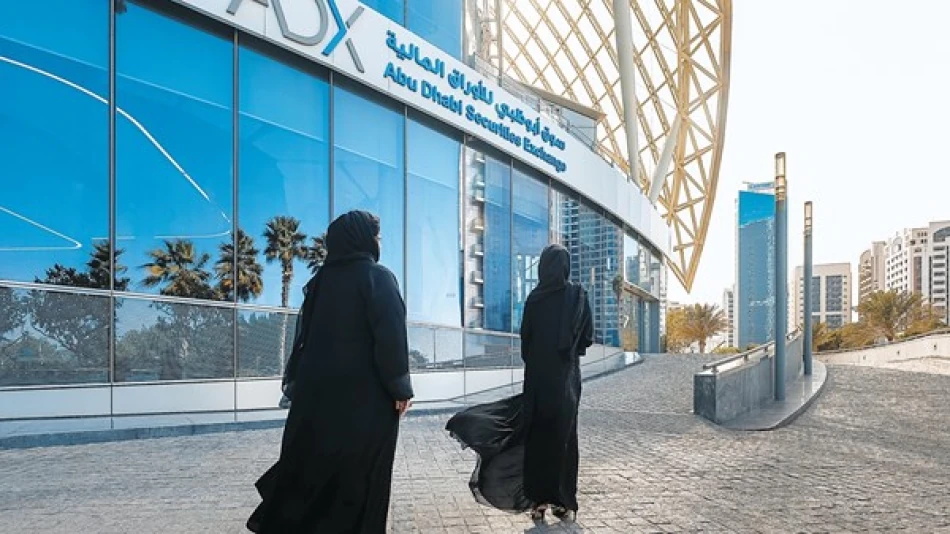
UAE Investors Snap Up $353M in Local Stocks Despite Profit-Taking
UAE Investors Cushion Market Decline Amid Banking and Real Estate Profit-Taking
Emirati investors stepped up their buying activity yesterday, injecting AED 1.3 billion into local stock markets and limiting losses as traders took profits on banking and real estate stocks following strong recent gains. The domestic buying spree, concentrated primarily in Abu Dhabi, demonstrates local confidence despite foreign investors pulling back from UAE equities.
Local Capital Provides Market Stability
The intervention by UAE nationals proved crucial as both the Abu Dhabi Securities Exchange and Dubai Financial Market faced selling pressure. Emirati investors recorded net purchases exceeding AED 132 million across both exchanges, with AED 855.91 million in Abu Dhabi and AED 445.53 million in Dubai.
This pattern reflects a broader trend seen in Gulf markets where domestic investors often act as stabilizing forces during periods of foreign capital flight. Similar dynamics have played out in Saudi Arabia's Tadawul, where local institutional investors frequently step in during market corrections.
Abu Dhabi Exchange Shows Resilience
The ADX general index declined 0.26% to close at 10,234.65 points, a relatively modest drop given the profit-taking activity. Trading volume reached AED 1.22 billion across 413.71 million shares through 23,408 transactions.
International Holding Company dominated trading activity with AED 207.21 million in transactions, followed by ADNOC Gas at AED 145.21 million. The energy sector's prominence underscores the UAE's continued focus on monetizing its hydrocarbon assets through public markets.
Foreign investors, however, were net sellers to the tune of AED 147 million, purchasing AED 266 million worth of shares while selling AED 413 million. This selling pressure from international investors suggests some profit-taking after the market's strong performance in recent months.
Dubai Market Faces Steeper Decline
Dubai's market experienced more pronounced weakness, with the DFM index falling 0.8% to 6,045 points. The emirate's exchange saw AED 764 million in total trading volume across 303.48 million shares.
Air Arabia led trading activity with AED 194.6 million in transactions, while real estate giants Emaar Properties and Amlak also featured prominently. The focus on aviation and real estate stocks reflects Dubai's economic pillars and investor interest in the emirate's post-pandemic recovery story.
Market Dynamics Signal Maturation
The current market behavior suggests the UAE's equity markets are maturing, with local investors becoming more sophisticated in their approach to market volatility. The fact that domestic buyers stepped in during foreign selling mirrors patterns seen in more developed markets like Singapore and Hong Kong, where local institutional investors often provide liquidity during periods of international uncertainty.
Financial institutions were net sellers in both markets, offloading AED 116.74 million in Abu Dhabi and AED 91.73 million in Dubai. This institutional selling likely represents portfolio rebalancing rather than fundamental concerns about market direction.
Investment Implications
For international investors, the UAE's market correction presents potential entry points, particularly given the strong domestic buying interest. The country's economic diversification efforts, coupled with its position as a regional financial hub, continue to attract long-term capital.
The profit-taking in banking and real estate sectors appears tactical rather than strategic, following significant gains in these sectors. UAE banks have benefited from rising interest rates and economic growth, while real estate has rebounded strongly from pandemic lows.
With total market capitalization standing at AED 3.12 trillion for Abu Dhabi and AED 1.043 trillion for Dubai, the UAE's equity markets remain relatively small compared to regional peers like Saudi Arabia, suggesting room for further growth as more companies pursue public listings.
Most Viewed News

 Layla Al Mansoori
Layla Al Mansoori






